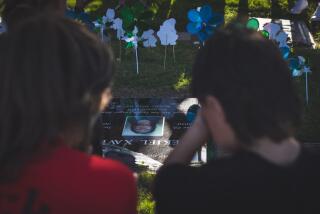Boy, 3, Shows Police Father’s Marijuana
- Share via
OXNARD — Hailing him as a hero, Oxnard police said Wednesday that they have awarded a special junior officer badge to a 3-year-old boy for helping them arrest his father on charges of marijuana possession.
And--after spending the night in the Ventura County Jail and enrolling Wednesday afternoon in a drug treatment program--the boy’s father said he agreed that his son had done the right thing.
“I’m glad he did it,” Keith Wallace said in a brief interview outside his west Ventura home. It’s a very humbling experience to be busted by your own flesh and blood, he said. “It makes you want to stop using drugs. It gives you the definite desire to stop.”
The child’s mother, however, was not in such a positive mood. Described as extremely angry when first contacted by police, she was in tears Wednesday afternoon. “I can’t take any more of this,” she said.
Police would not identify the child because of his age, and his parents also refused to, but the police made it clear they see him as a new poster child of sorts for the local narcotics squad.
“In about 20 years, we may interview him for a job,” department spokesman David Keith said.
Wallace, 25, was already in trouble when his son got into the act. Oxnard Police Officers Mike Marostica and Sergio Figueroa had pulled Wallace over about 6:40 p.m. Tuesday, saying that they clocked him driving 78 mph in a 55 mph zone.
The officers said they detected the smell of alcohol, and also noted that the young boy was not secured in a car seat. As Figueroa administered a field sobriety test, Marostica kept an eye on the boy, who was roaming around in the car.
That’s when the child reached out the window, holding a bag containing less than an ounce of marijuana, Keith said. He quoted the boy as telling Marostica the dope was “bad” before handing it over.
“Kids say the darndest things,” Keith said.
The officers would have searched the car under the circumstances anyway, Keith said, because they check all vehicles before towing them to an impound yard. But he said they still might not have found the drugs without the boy’s help.
Before releasing him to the custody of his mother, they pinned him with an Oxnard Police Department Junior Officer badge, the same ones they hand out at anti-drug sessions in local schools.
It’s unclear where the boy learned that marijuana is “bad,” but Keith said Oxnard officers sometimes take their anti-narcotics message into the preschools, so he might have picked it up there. Or it could have come from the parents themselves.
His parents said they think he probably learned it from them.
“We taught him well,” said Wallace, who was arrested on suspicion of speeding, driving on a suspended license, driving under the influence of alcohol, not having his son in a child seat, possession of marijuana and child endangerment. He was released on his own recognizance.
Psychologists and school officials said Wednesday that they were surprised at the boy’s actions because of his age but added that police and other anti-drug activists are reaching out to younger and younger children in an effort to catch them at their most impressionable.
Lane Jackson, a vice principal at Balboa Middle School in Ventura, said one student or another goes to the campus-assigned police officer at least once every quarter to report drug use by their parents or another relative.
In such cases, he said, authorities must always be concerned about the danger of parental retaliation. Beyond that, there is a broken trust that can take years to mend, if ever.
However, he said, such an arrest can sometimes become a turning point for the family, if the parent realizes there is a problem and tries to change for the sake of the child.
“Apparently,” Jackson said, “[Wallace] had no regrets about putting that child in danger.”
Child services officials are not called into such situations in Ventura County unless there are obvious signs of abuse or no family member can be located, police spokesman Keith said.
Some form of family counseling would probably be a good idea, said Robert DeMayo, director of the Psychological and Educational Clinic at Pepperdine University. That would help the child deal with what happened, he said, adding that the boy is probably already confused by the mixed messages that drugs are bad but some parents use them.
“It depends a great deal on the family’s reaction,” he said. “If the family’s reaction is to chastise and punish the child for violating the family’s secret, then that’s likely to be damaging and very confusing to the child.”
Wallace said he holds no anger, and that he’s already learned something from his experience: “I learned that jail is not a fun place, and I don’t want to go back.”
Andy Rose is a Times staff writer. Scott Steepleton is a correspondent.
More to Read
Sign up for Essential California
The most important California stories and recommendations in your inbox every morning.
You may occasionally receive promotional content from the Los Angeles Times.










